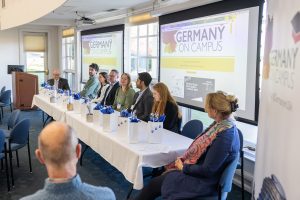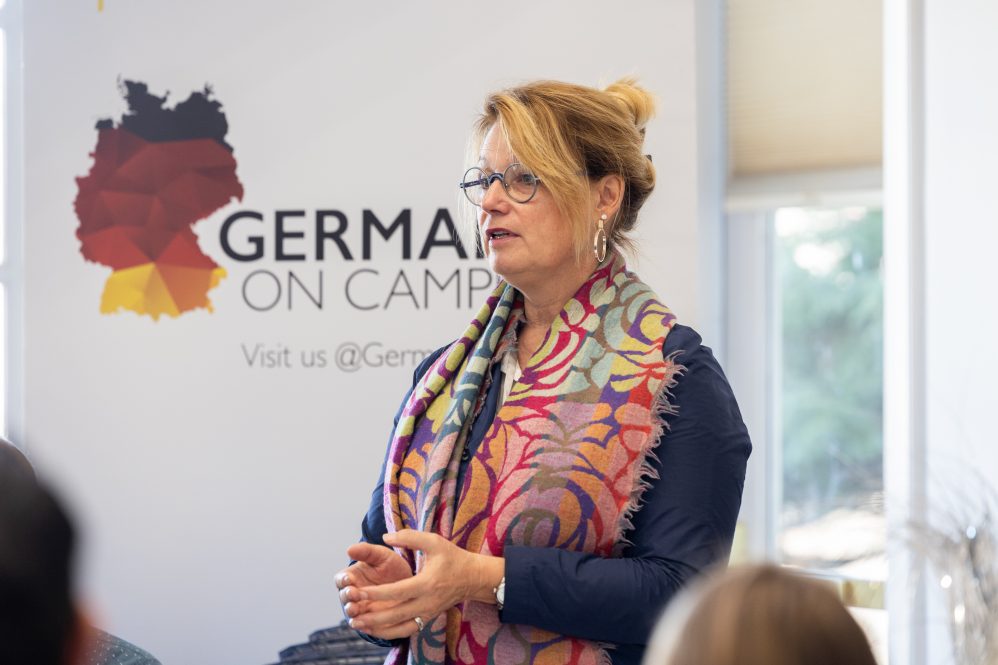After studying and working in Germany for a year, Michelle Buerkler ’24 (BUS) found herself in high demand in the job market. Potential employers were impressed by her willingness to take a risk, become fluent in German, and immerse herself in a new culture far from home.
Through UConn’s EUROBIZ program, Buerkler, a business management major, interned at TRUMPF, a high-tech company that provides manufacturing solutions and studied in Germany. She was subsequently offered a full-time job with Trumpf, and is now working as a project engineer at its North American headquarters in Farmington.
“I think the recruiters were impressed by the international experience as it builds resilience and a stronger work ethic,’’ she says. “Having this experience helped to grow my confidence, be more outgoing, and learn that being uncomfortable can help me to grow and challenge myself.’’
Sydney Smith-Romanski ’18 (ENG), who majored in biomedical engineering, participated in the companion EUROTECH program at UConn in 2016-17, and worked in a prestigious university laboratory in Germany. She was able to complete the program without delaying her graduation plans. Today she is a staff systems engineer at Siemens Healthineers, a diagnostic medical-tech company.

“My year studying and working abroad in Heidelberg, Germany was transformative professionally and personally,’’ she says. “Through opportunities and challenges, my worldview expanded, and I grew into a more independent, yet empathetic, version of myself!’’
‘Germany on Campus’ program connects students, German employers
Both women were guest panelists at the Germany on Campus Intercultural Symposium and Company Expo at the Alumni Center in Storrs on Nov. 14. The program allowed students to explore a unique, year-long learning opportunity in Germany, and welcomed German companies to network with potential employees.
Connecticut has a powerful partnership with German companies and more than 100 of them have their North American headquarters or satellite offices in our state. German powerhouses Trumpf, Boehringer Ingelheim, Henkel, Stopa America, MTU Aero Engines and emb-papst were among those in attendance.
Last summer, Gov. Ned Lamont and a delegation traveled to Germany to discuss opportunities to expand German companies in Connecticut. The state currently exports more than $2 billion in goods to Germany annually, and German companies employ more than 10,000 people in the state.
Companies Look to UConn to Help Fill Global Workforce Shortage
Sarah Worden is the senior director of human resources at ebm-papst, a high-tech German company that designs fans, refrigerator systems, and other air ventilation devices for large companies, including Amazon, Meta, Trane and Lennox. The company has facilities in Farmington. Worden says she had only recently learned about the UConn programs, and was attending the event in search of talent and connections.
“Having exposure to German companies and German life absolutely would set someone apart as a job candidate, and would add tremendous benefit to our organization,’’ she says. “We’re very happy to be here.’’
Ted Fisher, senior director of business development and advanced manufacturing at AdvanceCT, noted that there is a global workforce shortage, and that smart UConn students are very much in demand not only nationally but around the world. Precision manufacturing remains a strength in the state of Connecticut, he says.
MTU Aero Engines, a German company with offices in Rocky Hill, designs and develops commercial jet engines and is a strategic partner of Pratt & Whitney. President Jon Leach, who attended the event, has hired EUROTECH graduates in the past. He told students and faculty that as significant as AI advances are, there is no replacement for human companionship and the support of a team. His company is seeking potential employees with both technical abilities and interpersonal skills.
Profound Impact on the World
The Germany on Campus event drew Consul General of Germany Sonja Kreibich and Jan Lüdert, head of programs at the German Center for Research and Innovation in New York, as well as the deans of the School of Business, College of Engineering, and College of Liberal Arts and Sciences.
Lüdert says becoming intercultural citizens allows future business leaders to address global challenges, gain the perspective only available through diverse experiences, and build bridges of understanding. He told the students they can make a profound impact on the world moving forward.
Lüdert was one of several speakers who pointed out that work cultures differ between Germany and the United States. While both nations pride themselves on innovation, Germans tend to value long-term planning, precision, methodology and stability. Americans tend to value change, flexibility, and agility. It takes some cultural sensitivity to navigate those differences, but when the two styles combine, the outcomes tend to be more exciting, he says.
Professors Gerlinde Berger-Walliser, co-director of EUROBIZ, and Anke Finger, co-director of EUROBIZ and EUROTECH programs, say they are overjoyed by the enthusiasm and new connections that developed at the symposium. The dual-degree programs include one year of study and interning abroad, offering a depth of experience that few other universities provide, they said.
Remy Hutten ‘25 (CLAS), a communications major who is interested in business, attended the event to learn more about job opportunities in Germany, which he visited briefly last year and enjoyed.
“If I won $1 million, I’d move to Europe. The people are so nice, I love the food, and I love German cars,’’ says the Stamford native. “I don’t need much convincing. I’d take the first flight out tomorrow.’’
To learn more about the EUROBIZ program, please visit Eurobiz.uconn.edu and to inquire about EUROTECH, please visit undergrad.engr.uconn.edu.



